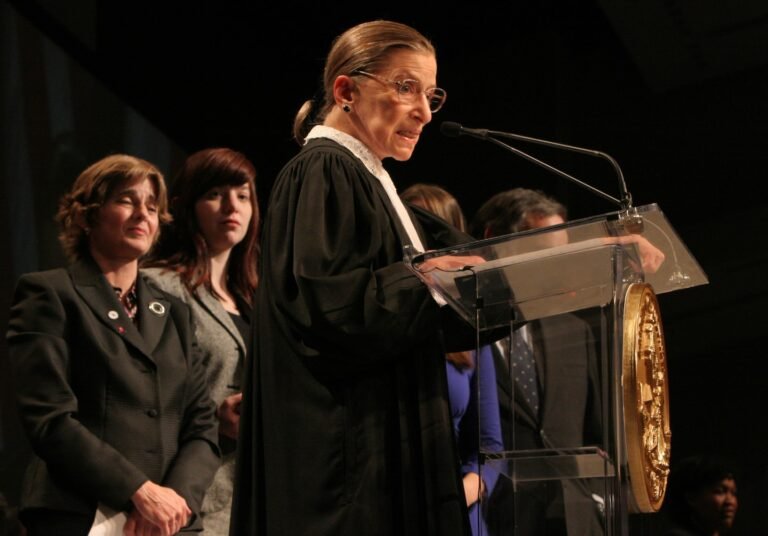Trent James Russell faces up to 22 years in prison for illegally accessing Ginsburg’s records in violation of federal privacy laws and could face fines of tens of thousands of dollars if convicted on all charges at his trial in U.S. District Court in Alexandria.
According to court documents, Russell, 34, has pleaded not guilty to the incident and told investigators looking into the leak during his initial interview in February 2019 that “my cat might have run over the keyboard.”
According to court testimony, the investigation began shortly after the data breach, when Supreme Court police discovered Ginsburg’s medical records were circulating on social media and asked the FBI for help. A former hospital executive testified that the spouse of a George Washington employee also discovered the justice’s medical records had been posted online and notified administrators.
Record first appeared on 4chan FBI agents testified Monday that the video went viral on Twitter and YouTube. Screenshots shown in court included Ginsburg’s name and the exact dates and times when she underwent radiation, oncology and surgical treatments at the hospital between 2014 and around 2018.
Justice Ginsburg died at her home in Washington in September 2020, a year after the data breach. She was 87 years old. The second woman to serve on the Supreme Court, Justice Ginsburg, as a mother and a Jew, broke through the limitations of a legal field dominated primarily by white Protestant men. As a judge, she was known for her fierce opinions in support of gender equality and minority rights. A Supreme Court police officer testified that he accompanied the judge to hospital at least two or three times when her health began to deteriorate, and that visits were always arranged “as discreetly as possible” to protect her privacy.
Witnesses said Russell’s employer, the Washington Area Transplant Community, a federally designated organization that works to identify dying patients who might receive organ transplants, never referred Ginsburg to them as a potential organ donor.
Lori Brigham, the organization’s founder and former chief executive, said transplant coordinators like Russell “have no right to be involved in the medical records” of patients who haven’t been referred to her. She said Russell knew the rules well, having signed numerous consent forms and undergone training.
Hospital officials discovered that the searches of Ginsburg’s data had come from one of Russell’s home computers, a witness said Monday. U.S. officials said that when investigators asked him about the leak during his initial interview in 2019, Russell lied and said his phone had been stolen. Investigators said Russell then deleted the data from the home computer’s hard drive.
His lawyer, Charles Burnham, disputed this portrayal in court documents. “Investigators learned that Mr. Russell did not erase the hard drive, but in fact simply ‘formatted’ it, which is not the same thing.” Formatting a hard drive means erasing data to improve system performance. Burnham did not respond to a request for comment Monday. Mr. Russell also told investigators that he shared hospital login credentials with others.
Judge Michael S. Nachmanoff appointed 12 jurors and two alternate jurors for the trial, which is expected to conclude in less than a week.Prosecutors argued Monday that Russell violated Ginsburg’s privacy rights under the federal Health Insurance Portability and Accountability Act, or HIPAA, which protects the confidentiality of patients’ medical information.
“Do the social media posts about Justice Ginsburg’s health records relate to hospital operations?” Assistant U.S. Attorney Zoe Bedell, the lead prosecutor in the case, asked Nathan Reed, who led the George Washington University Hospital’s internal investigation into the breach.
Reed, who was the hospital’s chief information officer at the time, said he wasn’t authorized to disclose the information. Russell had access to patient records because he worked as a contractor and was frequently on-site to evaluate potential organ transplant patients, he said. Reed said Russell’s access was revoked immediately after he was identified as a suspect in January 2019. But Russell contacted the hospital’s IT help desk the following month to ask for his access to be reinstated, but was denied, Reed testified.
A hospital employee also conducted unauthorized searches that could have uncovered Ginsburg’s data before and after the breach, Reed said, but the individual did not appear to be tech-savvy enough to post the information on social media and was therefore not considered the culprit. That individual, too, has been fired, Reed said.
Brigham testified that Russell, who now lives in Nebraska, was not known for bringing politics or “weird conspiracies” to work. Prosecutors said they found 4chan posts on Russell’s hard drive that delved into anti-Semitic conspiracy theories, including one titled “Mossad Tried to Assassinate President Trump During the White House Christmas Tree Lighting” and Google searches for “Dirty Jews.”


